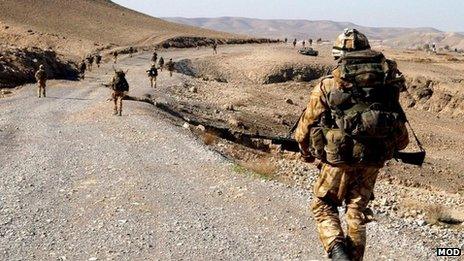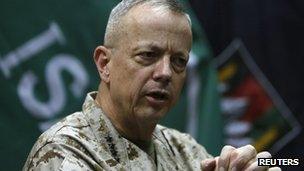Is the UK abandoning its Afghan interpreters?
- Published

British troops rely on Afghan interpreters - but will they be left behind?
The American who has just relinquished command of all Nato forces in Afghanistan, General John Allen, says: "We have an obligation to look after them". But the Afghan interpreters who work for the British, often in battle and always in danger, feel they have been abandoned, reports BBC Defence Correspondent Jonathan Beale.
They interpreters are young men like Abdul, who is now in hiding. We arrange to meet him at an agreed location near Kabul.
As well as carrying his old Nato credentials he holds a folder with the death threats he says he has received. Fears for his own safety and that of his family have forced him to give up his job.
He shows the letters from the Taliban accusing him of spying and warning that he'll be punished. He says he received a similar telephone call the night before.
Abdul tells me that when the British leave he and the other interpreters who have worked for them will be the first targets. "They will chop our heads off," he says.
He has shown the same messages to the British authorities in Kabul, but so far he says his requests for asylum have been rejected. He asks: "What kind of proof do they need?" When he's dead, he says, it will be too late.
'They'll target me'
Abdul is not alone. On a recent trip to a large military base in Helmand, we were approached by a group of more than a dozen interpreters who work for the British, all now worried about what will happen when Nato leaves.
They wait until our media minders have gone before they talk. They are mostly men in their twenties and thirties, some dressed in their British military uniforms waiting to go out on patrol.
We are not allowed to show their faces, or use their real names - one indication of the real dangers they face.
Naz, who has been working for British troops for three years, tells me that when he goes on leave back home near Kabul, he goes "hidingly". He says he is scared that his neighbours and relatives might find out what he does.
Like Abdul, his biggest concern is what happens when the British leave. He has no doubt "they will target me to kill me". I ask who are "they"? The Taliban, he says.
Mohammed, who comes from Helmand, says: "The withdrawal of British forces will land me in deep trouble". Another, Zah, highlights the daily threats they face from locals: "They call us infidels - you work for the infidels so you are infidel!"
None of them believe that the Afghan police or army will be able to protect them, saying "they can't even protect themselves".
'No luck'
More than 600 interpreters work for the British military and Foreign Office. More than 20 have already been killed, with dozens more seriously injured. The interpreters tell me that another five have been killed while off duty, targeted by insurgents.
Their employers explain the dangers before they sign up to the job. They are paid more than $1,500 a month - a handsome wage in Afghanistan. But the departure of Nato forces is focusing minds on what happens next.
Most Nato countries have already set up special programmes to allow their interpreters to apply for asylum. But Britain has not.
In a statement the Ministry of Defence insisted it will not abandon its interpreters and that measures had been taken to reduce the risks they face. But the government says claims for asylum will be considered on merit on a case-by-case basis.
In answer to a recent parliamentary question the government stated: "We believe that a case-by-case assessment is a more reasonable and proportionate response than that adopted by the previous government's mass resettlement of over 900 locally employed staff in Iraq."
It said "that scheme was expensive, complex to administer and took little account of any individual need for protection".

General John Allen says Nato forces have an obligation to look after their interpreters
Back in Helmand the interpreters want to know why they are not being offered the same help as those Iraqi interpreters who worked for the British. One says: "They should think about us." Another claims that all other Nato interpreters are being offered refuge, but they are not. "This is not fair!" he says.
Before he left Afghanistan as the overall commander of Nato forces, General John Allen says he shook the hands of 50 interpreters who worked for him. He says they are Afghan patriots.
"They've been wounded, they've died alongside us and they are tremendously dedicated to the cause. I think we have an obligation to look after them."
Gen Allen says each Nato country will have to decide how it deals with the issue, depending on its own immigration rules. But he points out that in other recent conflicts the nations involved have made special efforts to take account of their commitment.
Back near Kabul, Abdul is still hoping that he can change the British government's mind. He is one of a number of Afghans taking part in a legal challenge.
Lawyers Leigh Day and Co have written to the government asking for the scheme adopted in Iraq to be extended to Afghanistan.
Abdul says his situation is no different to that of the interpreters who worked in Iraq.
"They got the luck and we have not," he says.